
Student News
News, information, and events for your student life.


My online exam experience and top tips for students
The Covid-19 pandemic has altered everyone’s lives significantly and students have certainly not been exempt from this. Over the last year, we’ve been unable to return to University and sit our examinations as normal, which meant having to undertake online assessments. And it looks like this semester’s will remain largely online too.
Online examinations were definitely daunting at first because they were the ‘unknown’ for so many of us. However, the final overwhelming opinion from my friends seems to be that they really helped to alleviate exam stress and allow students to study for subject knowledge rather than to simply pass an exam.
After sitting numerous online exams to date, I thought this would be a good time to share my experiences and give you some of my helpful tips for the upcoming assessment period. .
How to study for an online examination
Online exams have definitely been beneficial for me. I find myself thinking less about the practicalities of an examination and, instead, focusing my attention on revision. I really appreciate having the time to read into topics and study them in depth, rather than memorising superficial information to pass a test.
So, I would recommend using this opportunity to gain a deeper understanding of your subject area and expand your knowledge further than the curriculum, especially if your exam is open book. It is also helpful to condense content into concise and reader friendly notes. This will enable quick access to information during the examination and provide you with a resource bank of material for the future.
It is important to note that revision is still essential, even for online examinations. A lack of adequate preparation will only result in an unnecessary amount of stress during the exam. Find comfort in knowing that you have power over the exam, perhaps more so than you ever have.
Where to sit your online examination
Perhaps the strangest part of the online format was sitting down at my desk rather than in an examination hall. I really benefited from the new circumstances and definitely felt less apprehensive. There was no exam hall, intimidating invigilators or hundreds of students tapping their pens – the perfect examination conditions, if you ask me!
Even though you are in the comfort of your own home, I would encourage you to ensure that you are fully dressed, well fuelled, and in a sensible study space (which does not include your bed) . Triple check your Wifi connection before beginning and make sure your household knows to keep the noise down. If you experience any technical issues, stay calm and make a note of them before contacting your examination lead. They will understand complications can occur with technology and will not penalise you for something beyond your control.
Online exams do not have to mimic a traditional exam format, the beauty of this assessment style is that you are in full control of your environment. It is important to be as comfortable as possible and if that means having a cup of tea or hot water bottle by your side, then so be it.
When to do your online examinations
Sometimes, I feel so rushed in a traditional exam that it is hard to gather my thoughts and construct a coherent answer. The lack of time pressure in an online exam means that all my answers are much more considered and structured better.
Do not expect to complete all your exams in one day. Rome was not built in a day, right? Take the time to go through them and give yourself regular breaks to reorientate your thoughts. Use the extra time to really think about the questions and how to answer them to the best of your ability.
Final thoughts
There has been some controversy as to whether online exams are as effective as the normal format. I, personally, praise the online assessment system. I find it less stressful, less complicated, and feel that it assesses capabilities beyond memorisation. I wouldn’t go as far as to say that I enjoyed taking these exams, but they were about as good as an exam could get.
Remember to stay calm, prepare, and do your best. That is all anyone can ask of you, online or in person.
Share this:
CBSE Library
My Experience In The Examination Hall Essay | Essay on My Experience In The Examination Hall for Students and Children in English
My Experience In The Examination Hall Essay – Given below is a Long and Short Essay on My Experience In The Examination Hall of competitive exams, kids and students belonging to classes 1, 2, 3, 4, 5 6, 7, 8, 9, and 10. The My Experience In The Examination Hall essay 100, 150, 200, 250, 500 words in English helps the students with their class assignments, comprehension tasks, and even for competitive examinations.
You can also find more Essay Writing articles on events, persons, sports, technology and many more.
Long Essay on My Experience In The Examination Hall 500 Words for Kids and Students in English
It is interesting to pen a few lines on the experience that I had in the examination hall. I was appearing for the first time for my 10th boards. I read a lot on the night preceding the examination day. I revised my entire course.
Though my father warned me against the consequences of studying late in the night, unfortunately I did not pay any heed to his advice. I reached the examination hall on right time. As I was climbing the stairs, the first bell rang. I rushed to the hall and searched for the seat that was supposed to have my roll number.

Within five minutes, all the examinees took their respective seats. My heart was beating fast. I began to feel nervous. The superintendent of the examination read out instructions aloud to the students. He warned the examinees against keeping any objectionable papers or notebooks in their pockets during the examination hour. However, the examinees were allowed to retain their money, bus passes and admission tickets. The superintendent also warned the candidates against using their mobile phones or any other electronic devices.
He then broke the official seal of the envelope containing the question papers. At this time, there was pin-drop silence in the hall. I became all the more nervous. Then, the supervisors distributed the question papers to the examinees. As I received the question paper, I got confused. I began to read it but could not understand the questions. I made a second attempt at reading the questions.
This time, I understood all the questions and some of them seemed to be easy to me. Other examinees were seen looking hither and thither. Some of them were busy in writing while others were gazing at the ceiling of the examination hall. Some were trying to whisper and talk. An examinee was found copying from another one and the supervisor pointed his accusing finger at them. Both were expelled from the hall. This was a stern warning to others who were trying to copy.
As the first bell rang, I had already started solving the questions. I did the easy questions first and then attempted the difficult ones. After some time, one examinee fell off from his seat, as he was not well. He became unconscious. Attention was diverted towards him. Soon, the doctor came and gave him medical aid. He came to his senses but the doctor advised him not to exert any more. So he left the examination hall without completing his paper.
There was another bell. Now, only half an hour was left. I completed my paper and revised the entire answer sheet. While revising I corrected the mistakes that I had carelessly made. I tied all the extra-sheets to my main answer book. Then there was the last and final bell. The superintendent of the hall announced that no one should write anything from that moment onwards.
Soon the invigilators collected the answer books. I was feeling tired at that time. Finally I came out of the examination hall. This interesting and unique experience shall always be remembered and recollected by me in my life. I learnt a lot about the precautions to be taken and instructions to be followed during the period of examination.
Leave a Comment Cancel reply

Experience Essay
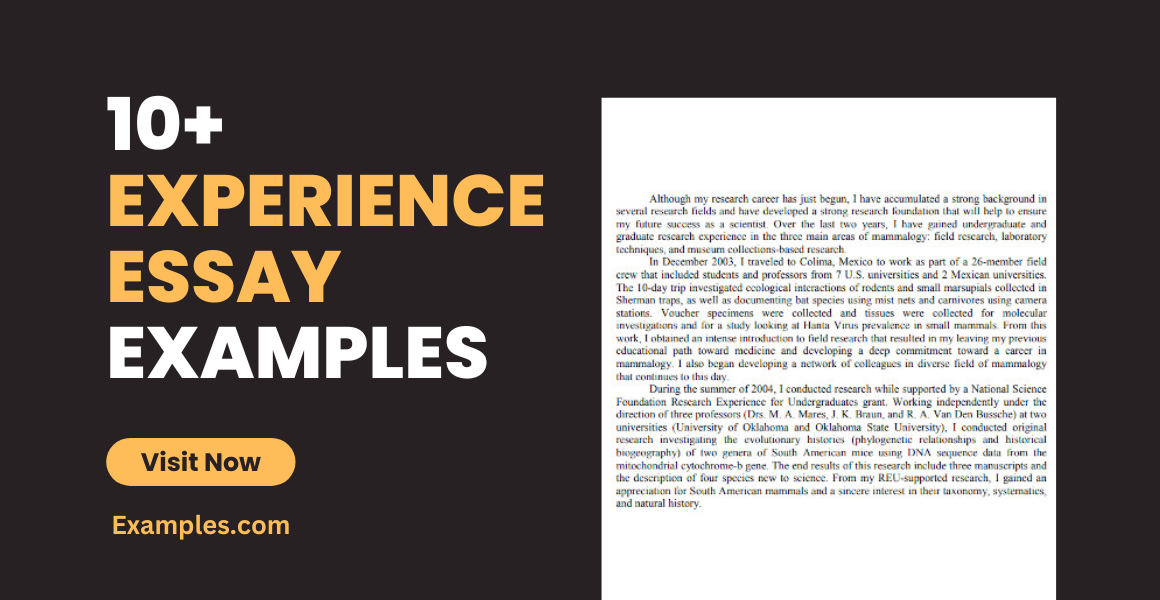
People love talking about their experiences with their family, friends, and loved ones. You can use your love for that to practice and enhance your essay writing skills. Yes, you have read it right. It is like hitting two birds with one stone. Tell your story by composing an experience essay.
10+ Experience Essay Examples
1. research experience essay.
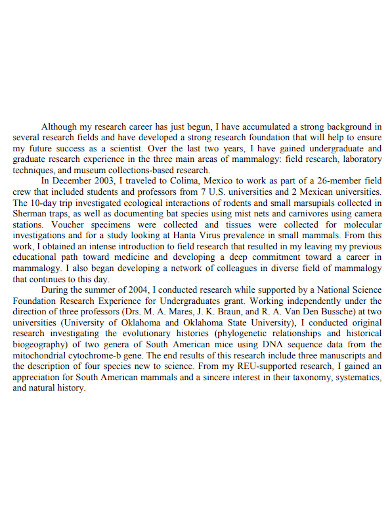
Size: 732 KB
2. Formal Experience Essay
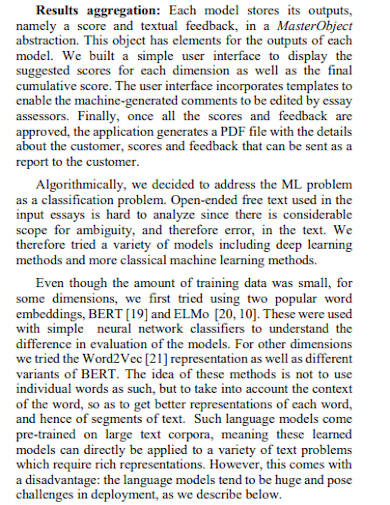
Size: 209 KB
3. Experience of Life Essay
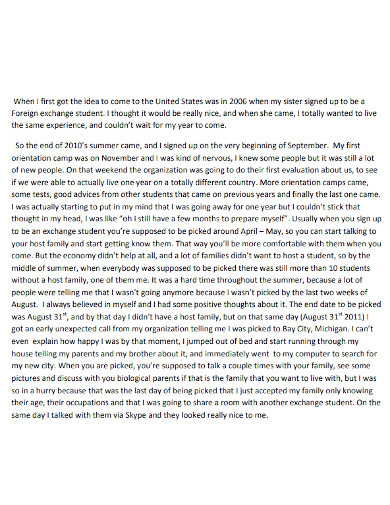
Size: 197 KB
4. Academic Personal Experience Essay
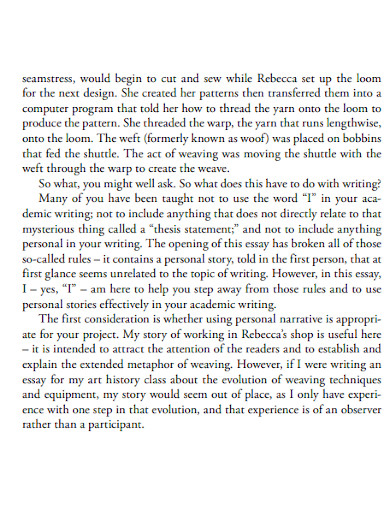
Size: 188 KB
5. COVID-19 Experience Essay
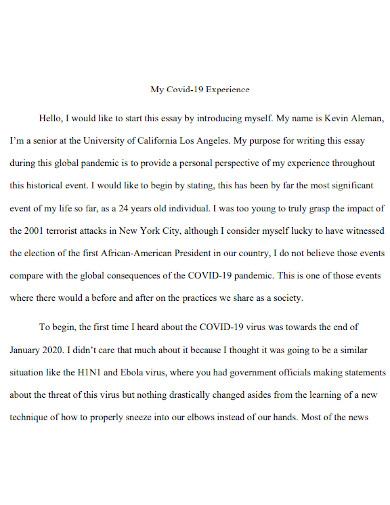
Size: 76 KB
6. Work Experience Essay
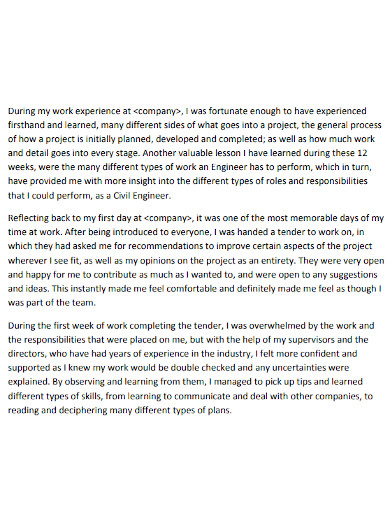
Size: 75 KB
7. Post Graduation Experience Essay
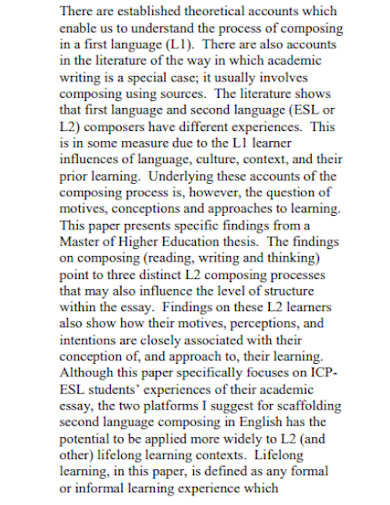
Size: 41 KB
8. Previous Research Experience Essay
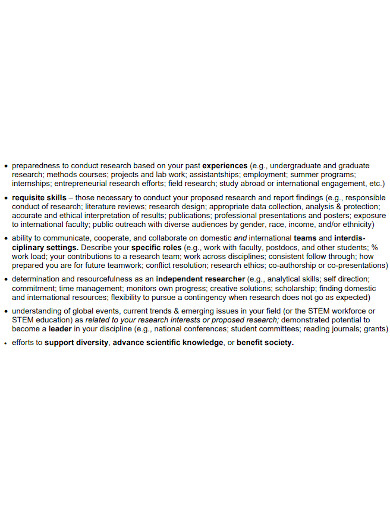
Size: 28 KB
9. Sample Experience Essay
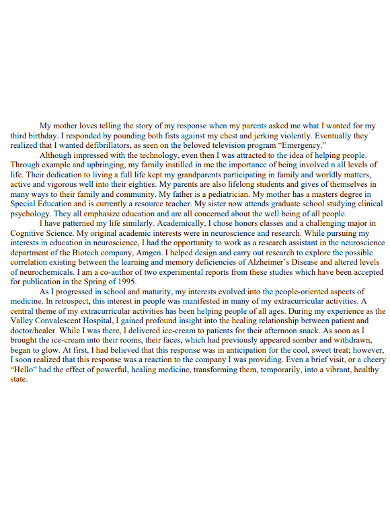
Size: 44 KB
10. Coaching Experience Essay
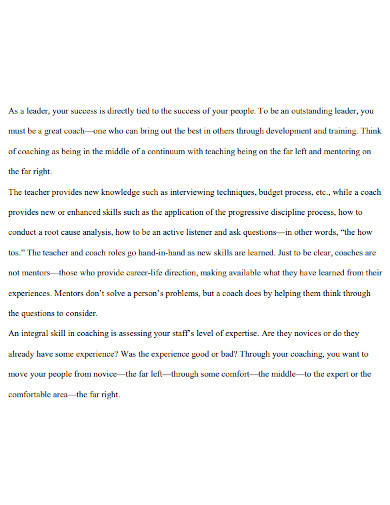
Size: 19 KB
11. College Experience Essay
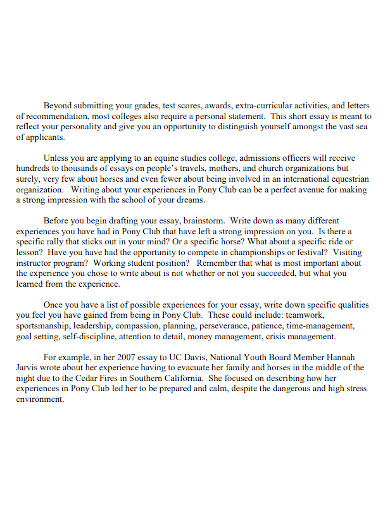
Size: 31 KB
What Is an Experience Essay?
An experience essay is a composition that requires you to narrate an event that you have personally experienced. It is a type of academic essay that most high school, colleges, and post-graduation studies assign their students to write to improve their writing. Most scholarship applications also require you to write this essay. In addition, some people devise this as a part of their resume when applying for work.
How to Compose a Riveting Experience Essay
Composing various literature essays will also require you to apply different skills. In that sense, this piece of writing will test your storytelling skills. How do you effectively narrate a story on a paper? You can discover that as you go through the process of learning how to devise this document.
1. Choose an Unforgettable Memory
In selecting an experience to tell, you should choose those experiences that considerably impacted your personal life. It can be either be a positive or a negative experience. For example, you can write about your best day or the worst experience you had. Most people would opt for unique topics, but that is not a requirement. The important thing is how to make your unforgettable experience memorable for your readers.
2. Arrange the Sequence of Events
Sometimes when people share something, they often tell another story in between and then go back to their original topic. That’s a no-no in writing your experience essay. It needs to be carefully structured. That said, you need to arrange it by properly sequencing the events. There are available blank outline templates online to help you with this task.
3. Devise an Engrossing Introductory Paragraph
An impressive introduction should contain a compelling hook and a powerful thesis statement . The first paragraph of your essay can be a make or break factor for your entire writing. People often start judging the quality of your composition after reading your introductory paragraph. It sets the vibe and gives them the first impression. It is essential to pay a lot of attention to this segment.
4. Craft a Rousing Statement for Your Conclusion
Your conclusion paragraph should provide the gist and the purpose of your experience essay. In this last part, you should restate your thesis statement and summarize the underlying message of your writing. It should include a personal reflection regarding what that particular event made you learn about yourself. A conclusion for an essay should be powerful enough to rouse the emotions of your readers.
How should you describe an experience in your essay?
Writing a personal experience essay does not only require you to provide the order of events that happened in your experience. Instead, you should include describing what you are thinking and feeling at that moment. In addition, you should also mention the activities that are also happening during your experiences. Don’t forget to include the reactions of the people involved in your story.
What are good topics for an experience essay?
One of the most important factors to consider in choosing your topic is the thematic statement it presents. Do you want to write about love, friendship, or family? You can also choose to compose about the defining moments of your life. Such as the time you faced your greatest fears or the day you met your best friend.
What makes an experience essay different from a narrative essay?
An experience essay and a narrative essay are mostly similar. Both of these writings focus on narrating an experience of the writer. Despite that, there is something that sets them apart from each other. An experience essay focuses more on an individual’s discovery about oneself. On the other hand, the latter aims to inform the readers of how the experience made the writer realize things. Particularly the lessons regarding another person or an issue.
The act of composing this type of essay is a formative experience. In the process of writing it, you can learn lessons about yourself as well as on writing essays. Your life experiences are full of lessons. Ensure to capture the message and convey it to your readers. Secure that employment or that award certificate by crafting your experience essay thoroughly.
Experience Essay Generator
Text prompt
- Instructive
- Professional
Write an Experience Essay on your first day at school
Discuss a travel experience that changed your perspective in an Experience Essay

Choose Your Test
Sat / act prep online guides and tips, 177 college essay examples for 11 schools + expert analysis.
College Admissions , College Essays

The personal statement might just be the hardest part of your college application. Mostly this is because it has the least guidance and is the most open-ended. One way to understand what colleges are looking for when they ask you to write an essay is to check out the essays of students who already got in—college essays that actually worked. After all, they must be among the most successful of this weird literary genre.
In this article, I'll go through general guidelines for what makes great college essays great. I've also compiled an enormous list of 100+ actual sample college essays from 11 different schools. Finally, I'll break down two of these published college essay examples and explain why and how they work. With links to 177 full essays and essay excerpts , this article is a great resource for learning how to craft your own personal college admissions essay!
What Excellent College Essays Have in Common
Even though in many ways these sample college essays are very different from one other, they do share some traits you should try to emulate as you write your own essay.
Visible Signs of Planning
Building out from a narrow, concrete focus. You'll see a similar structure in many of the essays. The author starts with a very detailed story of an event or description of a person or place. After this sense-heavy imagery, the essay expands out to make a broader point about the author, and connects this very memorable experience to the author's present situation, state of mind, newfound understanding, or maturity level.
Knowing how to tell a story. Some of the experiences in these essays are one-of-a-kind. But most deal with the stuff of everyday life. What sets them apart is the way the author approaches the topic: analyzing it for drama and humor, for its moving qualities, for what it says about the author's world, and for how it connects to the author's emotional life.
Stellar Execution
A killer first sentence. You've heard it before, and you'll hear it again: you have to suck the reader in, and the best place to do that is the first sentence. Great first sentences are punchy. They are like cliffhangers, setting up an exciting scene or an unusual situation with an unclear conclusion, in order to make the reader want to know more. Don't take my word for it—check out these 22 first sentences from Stanford applicants and tell me you don't want to read the rest of those essays to find out what happens!
A lively, individual voice. Writing is for readers. In this case, your reader is an admissions officer who has read thousands of essays before yours and will read thousands after. Your goal? Don't bore your reader. Use interesting descriptions, stay away from clichés, include your own offbeat observations—anything that makes this essay sounds like you and not like anyone else.

Technical correctness. No spelling mistakes, no grammar weirdness, no syntax issues, no punctuation snafus—each of these sample college essays has been formatted and proofread perfectly. If this kind of exactness is not your strong suit, you're in luck! All colleges advise applicants to have their essays looked over several times by parents, teachers, mentors, and anyone else who can spot a comma splice. Your essay must be your own work, but there is absolutely nothing wrong with getting help polishing it.
And if you need more guidance, connect with PrepScholar's expert admissions consultants . These expert writers know exactly what college admissions committees look for in an admissions essay and chan help you craft an essay that boosts your chances of getting into your dream school.
Check out PrepScholar's Essay Editing and Coaching progra m for more details!

Links to Full College Essay Examples
Some colleges publish a selection of their favorite accepted college essays that worked, and I've put together a selection of over 100 of these.
Common App Essay Samples
Please note that some of these college essay examples may be responding to prompts that are no longer in use. The current Common App prompts are as follows:
1. Some students have a background, identity, interest, or talent that is so meaningful they believe their application would be incomplete without it. If this sounds like you, then please share your story. 2. The lessons we take from obstacles we encounter can be fundamental to later success. Recount a time when you faced a challenge, setback, or failure. How did it affect you, and what did you learn from the experience? 3. Reflect on a time when you questioned or challenged a belief or idea. What prompted your thinking? What was the outcome? 4. Reflect on something that someone has done for you that has made you happy or thankful in a surprising way. How has this gratitude affected or motivated you? 5. Discuss an accomplishment, event, or realization that sparked a period of personal growth and a new understanding of yourself or others. 6. Describe a topic, idea, or concept you find so engaging that it makes you lose all track of time. Why does it captivate you? What or who do you turn to when you want to learn more?
7. Share an essay on any topic of your choice. It can be one you've already written, one that responds to a different prompt, or one of your own design.
Now, let's get to the good stuff: the list of 177 college essay examples responding to current and past Common App essay prompts.
Connecticut college.
- 12 Common Application essays from the classes of 2022-2025
Hamilton College
- 7 Common Application essays from the class of 2026
- 7 Common Application essays from the class of 2022
- 7 Common Application essays from the class of 2018
- 8 Common Application essays from the class of 2012
- 8 Common Application essays from the class of 2007
Johns Hopkins
These essays are answers to past prompts from either the Common Application or the Coalition Application (which Johns Hopkins used to accept).
- 1 Common Application or Coalition Application essay from the class of 2026
- 6 Common Application or Coalition Application essays from the class of 2025
- 6 Common Application or Universal Application essays from the class of 2024
- 6 Common Application or Universal Application essays from the class of 2023
- 7 Common Application of Universal Application essays from the class of 2022
- 5 Common Application or Universal Application essays from the class of 2021
- 7 Common Application or Universal Application essays from the class of 2020
Essay Examples Published by Other Websites
- 2 Common Application essays ( 1st essay , 2nd essay ) from applicants admitted to Columbia
Other Sample College Essays
Here is a collection of essays that are college-specific.
Babson College
- 4 essays (and 1 video response) on "Why Babson" from the class of 2020
Emory University
- 5 essay examples ( 1 , 2 , 3 , 4 , 5 ) from the class of 2020 along with analysis from Emory admissions staff on why the essays were exceptional
- 5 more recent essay examples ( 1 , 2 , 3 , 4 , 5 ) along with analysis from Emory admissions staff on what made these essays stand out
University of Georgia
- 1 “strong essay” sample from 2019
- 1 “strong essay” sample from 2018
- 10 Harvard essays from 2023
- 10 Harvard essays from 2022
- 10 Harvard essays from 2021
- 10 Harvard essays from 2020
- 10 Harvard essays from 2019
- 10 Harvard essays from 2018
- 6 essays from admitted MIT students
Smith College
- 6 "best gift" essays from the class of 2018

Books of College Essays
If you're looking for even more sample college essays, consider purchasing a college essay book. The best of these include dozens of essays that worked and feedback from real admissions officers.
College Essays That Made a Difference —This detailed guide from Princeton Review includes not only successful essays, but also interviews with admissions officers and full student profiles.
50 Successful Harvard Application Essays by the Staff of the Harvard Crimson—A must for anyone aspiring to Harvard .
50 Successful Ivy League Application Essays and 50 Successful Stanford Application Essays by Gen and Kelly Tanabe—For essays from other top schools, check out this venerated series, which is regularly updated with new essays.
Heavenly Essays by Janine W. Robinson—This collection from the popular blogger behind Essay Hell includes a wider range of schools, as well as helpful tips on honing your own essay.

Analyzing Great Common App Essays That Worked
I've picked two essays from the examples collected above to examine in more depth so that you can see exactly what makes a successful college essay work. Full credit for these essays goes to the original authors and the schools that published them.
Example 1: "Breaking Into Cars," by Stephen, Johns Hopkins Class of '19 (Common App Essay, 636 words long)
I had never broken into a car before.
We were in Laredo, having just finished our first day at a Habitat for Humanity work site. The Hotchkiss volunteers had already left, off to enjoy some Texas BBQ, leaving me behind with the college kids to clean up. Not until we were stranded did we realize we were locked out of the van.
Someone picked a coat hanger out of the dumpster, handed it to me, and took a few steps back.
"Can you do that thing with a coat hanger to unlock it?"
"Why me?" I thought.
More out of amusement than optimism, I gave it a try. I slid the hanger into the window's seal like I'd seen on crime shows, and spent a few minutes jiggling the apparatus around the inside of the frame. Suddenly, two things simultaneously clicked. One was the lock on the door. (I actually succeeded in springing it.) The other was the realization that I'd been in this type of situation before. In fact, I'd been born into this type of situation.
My upbringing has numbed me to unpredictability and chaos. With a family of seven, my home was loud, messy, and spottily supervised. My siblings arguing, the dog barking, the phone ringing—all meant my house was functioning normally. My Dad, a retired Navy pilot, was away half the time. When he was home, he had a parenting style something like a drill sergeant. At the age of nine, I learned how to clear burning oil from the surface of water. My Dad considered this a critical life skill—you know, in case my aircraft carrier should ever get torpedoed. "The water's on fire! Clear a hole!" he shouted, tossing me in the lake without warning. While I'm still unconvinced about that particular lesson's practicality, my Dad's overarching message is unequivocally true: much of life is unexpected, and you have to deal with the twists and turns.
Living in my family, days rarely unfolded as planned. A bit overlooked, a little pushed around, I learned to roll with reality, negotiate a quick deal, and give the improbable a try. I don't sweat the small stuff, and I definitely don't expect perfect fairness. So what if our dining room table only has six chairs for seven people? Someone learns the importance of punctuality every night.
But more than punctuality and a special affinity for musical chairs, my family life has taught me to thrive in situations over which I have no power. Growing up, I never controlled my older siblings, but I learned how to thwart their attempts to control me. I forged alliances, and realigned them as necessary. Sometimes, I was the poor, defenseless little brother; sometimes I was the omniscient elder. Different things to different people, as the situation demanded. I learned to adapt.
Back then, these techniques were merely reactions undertaken to ensure my survival. But one day this fall, Dr. Hicks, our Head of School, asked me a question that he hoped all seniors would reflect on throughout the year: "How can I participate in a thing I do not govern, in the company of people I did not choose?"
The question caught me off guard, much like the question posed to me in Laredo. Then, I realized I knew the answer. I knew why the coat hanger had been handed to me.
Growing up as the middle child in my family, I was a vital participant in a thing I did not govern, in the company of people I did not choose. It's family. It's society. And often, it's chaos. You participate by letting go of the small stuff, not expecting order and perfection, and facing the unexpected with confidence, optimism, and preparedness. My family experience taught me to face a serendipitous world with confidence.
What Makes This Essay Tick?
It's very helpful to take writing apart in order to see just how it accomplishes its objectives. Stephen's essay is very effective. Let's find out why!
An Opening Line That Draws You In
In just eight words, we get: scene-setting (he is standing next to a car about to break in), the idea of crossing a boundary (he is maybe about to do an illegal thing for the first time), and a cliffhanger (we are thinking: is he going to get caught? Is he headed for a life of crime? Is he about to be scared straight?).
Great, Detailed Opening Story
More out of amusement than optimism, I gave it a try. I slid the hanger into the window's seal like I'd seen on crime shows, and spent a few minutes jiggling the apparatus around the inside of the frame.
It's the details that really make this small experience come alive. Notice how whenever he can, Stephen uses a more specific, descriptive word in place of a more generic one. The volunteers aren't going to get food or dinner; they're going for "Texas BBQ." The coat hanger comes from "a dumpster." Stephen doesn't just move the coat hanger—he "jiggles" it.
Details also help us visualize the emotions of the people in the scene. The person who hands Stephen the coat hanger isn't just uncomfortable or nervous; he "takes a few steps back"—a description of movement that conveys feelings. Finally, the detail of actual speech makes the scene pop. Instead of writing that the other guy asked him to unlock the van, Stephen has the guy actually say his own words in a way that sounds like a teenager talking.

Turning a Specific Incident Into a Deeper Insight
Suddenly, two things simultaneously clicked. One was the lock on the door. (I actually succeeded in springing it.) The other was the realization that I'd been in this type of situation before. In fact, I'd been born into this type of situation.
Stephen makes the locked car experience a meaningful illustration of how he has learned to be resourceful and ready for anything, and he also makes this turn from the specific to the broad through an elegant play on the two meanings of the word "click."

Using Concrete Examples When Making Abstract Claims
My upbringing has numbed me to unpredictability and chaos. With a family of seven, my home was loud, messy, and spottily supervised. My siblings arguing, the dog barking, the phone ringing—all meant my house was functioning normally.
"Unpredictability and chaos" are very abstract, not easily visualized concepts. They could also mean any number of things—violence, abandonment, poverty, mental instability. By instantly following up with highly finite and unambiguous illustrations like "family of seven" and "siblings arguing, the dog barking, the phone ringing," Stephen grounds the abstraction in something that is easy to picture: a large, noisy family.
Using Small Bits of Humor and Casual Word Choice
My Dad, a retired Navy pilot, was away half the time. When he was home, he had a parenting style something like a drill sergeant. At the age of nine, I learned how to clear burning oil from the surface of water. My Dad considered this a critical life skill—you know, in case my aircraft carrier should ever get torpedoed.
Obviously, knowing how to clean burning oil is not high on the list of things every 9-year-old needs to know. To emphasize this, Stephen uses sarcasm by bringing up a situation that is clearly over-the-top: "in case my aircraft carrier should ever get torpedoed."
The humor also feels relaxed. Part of this is because he introduces it with the colloquial phrase "you know," so it sounds like he is talking to us in person. This approach also diffuses the potential discomfort of the reader with his father's strictness—since he is making jokes about it, clearly he is OK. Notice, though, that this doesn't occur very much in the essay. This helps keep the tone meaningful and serious rather than flippant.

An Ending That Stretches the Insight Into the Future
But one day this fall, Dr. Hicks, our Head of School, asked me a question that he hoped all seniors would reflect on throughout the year: "How can I participate in a thing I do not govern, in the company of people I did not choose?"
The ending of the essay reveals that Stephen's life has been one long preparation for the future. He has emerged from chaos and his dad's approach to parenting as a person who can thrive in a world that he can't control.
This connection of past experience to current maturity and self-knowledge is a key element in all successful personal essays. Colleges are very much looking for mature, self-aware applicants. These are the qualities of successful college students, who will be able to navigate the independence college classes require and the responsibility and quasi-adulthood of college life.
What Could This Essay Do Even Better?
Even the best essays aren't perfect, and even the world's greatest writers will tell you that writing is never "finished"—just "due." So what would we tweak in this essay if we could?
Replace some of the clichéd language. Stephen uses handy phrases like "twists and turns" and "don't sweat the small stuff" as a kind of shorthand for explaining his relationship to chaos and unpredictability. But using too many of these ready-made expressions runs the risk of clouding out your own voice and replacing it with something expected and boring.
Use another example from recent life. Stephen's first example (breaking into the van in Laredo) is a great illustration of being resourceful in an unexpected situation. But his essay also emphasizes that he "learned to adapt" by being "different things to different people." It would be great to see how this plays out outside his family, either in the situation in Laredo or another context.

Example 2: By Renner Kwittken, Tufts Class of '23 (Common App Essay, 645 words long)
My first dream job was to be a pickle truck driver. I saw it in my favorite book, Richard Scarry's "Cars and Trucks and Things That Go," and for some reason, I was absolutely obsessed with the idea of driving a giant pickle. Much to the discontent of my younger sister, I insisted that my parents read us that book as many nights as possible so we could find goldbug, a small little golden bug, on every page. I would imagine the wonderful life I would have: being a pig driving a giant pickle truck across the country, chasing and finding goldbug. I then moved on to wanting to be a Lego Master. Then an architect. Then a surgeon.
Then I discovered a real goldbug: gold nanoparticles that can reprogram macrophages to assist in killing tumors, produce clear images of them without sacrificing the subject, and heat them to obliteration.
Suddenly the destination of my pickle was clear.
I quickly became enveloped by the world of nanomedicine; I scoured articles about liposomes, polymeric micelles, dendrimers, targeting ligands, and self-assembling nanoparticles, all conquering cancer in some exotic way. Completely absorbed, I set out to find a mentor to dive even deeper into these topics. After several rejections, I was immensely grateful to receive an invitation to work alongside Dr. Sangeeta Ray at Johns Hopkins.
In the lab, Dr. Ray encouraged a great amount of autonomy to design and implement my own procedures. I chose to attack a problem that affects the entire field of nanomedicine: nanoparticles consistently fail to translate from animal studies into clinical trials. Jumping off recent literature, I set out to see if a pre-dose of a common chemotherapeutic could enhance nanoparticle delivery in aggressive prostate cancer, creating three novel constructs based on three different linear polymers, each using fluorescent dye (although no gold, sorry goldbug!). Though using radioactive isotopes like Gallium and Yttrium would have been incredible, as a 17-year-old, I unfortunately wasn't allowed in the same room as these radioactive materials (even though I took a Geiger counter to a pair of shoes and found them to be slightly dangerous).
I hadn't expected my hypothesis to work, as the research project would have ideally been led across two full years. Yet while there are still many optimizations and revisions to be done, I was thrilled to find -- with completely new nanoparticles that may one day mean future trials will use particles with the initials "RK-1" -- thatcyclophosphamide did indeed increase nanoparticle delivery to the tumor in a statistically significant way.
A secondary, unexpected research project was living alone in Baltimore, a new city to me, surrounded by people much older than I. Even with moving frequently between hotels, AirBnB's, and students' apartments, I strangely reveled in the freedom I had to enjoy my surroundings and form new friendships with graduate school students from the lab. We explored The Inner Harbor at night, attended a concert together one weekend, and even got to watch the Orioles lose (to nobody's surprise). Ironically, it's through these new friendships I discovered something unexpected: what I truly love is sharing research. Whether in a presentation or in a casual conversation, making others interested in science is perhaps more exciting to me than the research itself. This solidified a new pursuit to angle my love for writing towards illuminating science in ways people can understand, adding value to a society that can certainly benefit from more scientific literacy.
It seems fitting that my goals are still transforming: in Scarry's book, there is not just one goldbug, there is one on every page. With each new experience, I'm learning that it isn't the goldbug itself, but rather the act of searching for the goldbugs that will encourage, shape, and refine my ever-evolving passions. Regardless of the goldbug I seek -- I know my pickle truck has just begun its journey.
Renner takes a somewhat different approach than Stephen, but their essay is just as detailed and engaging. Let's go through some of the strengths of this essay.
One Clear Governing Metaphor
This essay is ultimately about two things: Renner’s dreams and future career goals, and Renner’s philosophy on goal-setting and achieving one’s dreams.
But instead of listing off all the amazing things they’ve done to pursue their dream of working in nanomedicine, Renner tells a powerful, unique story instead. To set up the narrative, Renner opens the essay by connecting their experiences with goal-setting and dream-chasing all the way back to a memorable childhood experience:
This lighthearted–but relevant!--story about the moment when Renner first developed a passion for a specific career (“finding the goldbug”) provides an anchor point for the rest of the essay. As Renner pivots to describing their current dreams and goals–working in nanomedicine–the metaphor of “finding the goldbug” is reflected in Renner’s experiments, rejections, and new discoveries.
Though Renner tells multiple stories about their quest to “find the goldbug,” or, in other words, pursue their passion, each story is connected by a unifying theme; namely, that as we search and grow over time, our goals will transform…and that’s okay! By the end of the essay, Renner uses the metaphor of “finding the goldbug” to reiterate the relevance of the opening story:
While the earlier parts of the essay convey Renner’s core message by showing, the final, concluding paragraph sums up Renner’s insights by telling. By briefly and clearly stating the relevance of the goldbug metaphor to their own philosophy on goals and dreams, Renner demonstrates their creativity, insight, and eagerness to grow and evolve as the journey continues into college.

An Engaging, Individual Voice
This essay uses many techniques that make Renner sound genuine and make the reader feel like we already know them.
Technique #1: humor. Notice Renner's gentle and relaxed humor that lightly mocks their younger self's grand ambitions (this is different from the more sarcastic kind of humor used by Stephen in the first essay—you could never mistake one writer for the other).
My first dream job was to be a pickle truck driver.
I would imagine the wonderful life I would have: being a pig driving a giant pickle truck across the country, chasing and finding goldbug. I then moved on to wanting to be a Lego Master. Then an architect. Then a surgeon.
Renner gives a great example of how to use humor to your advantage in college essays. You don’t want to come off as too self-deprecating or sarcastic, but telling a lightheartedly humorous story about your younger self that also showcases how you’ve grown and changed over time can set the right tone for your entire essay.
Technique #2: intentional, eye-catching structure. The second technique is the way Renner uses a unique structure to bolster the tone and themes of their essay . The structure of your essay can have a major impact on how your ideas come across…so it’s important to give it just as much thought as the content of your essay!
For instance, Renner does a great job of using one-line paragraphs to create dramatic emphasis and to make clear transitions from one phase of the story to the next:
Suddenly the destination of my pickle car was clear.
Not only does the one-liner above signal that Renner is moving into a new phase of the narrative (their nanoparticle research experiences), it also tells the reader that this is a big moment in Renner’s story. It’s clear that Renner made a major discovery that changed the course of their goal pursuit and dream-chasing. Through structure, Renner conveys excitement and entices the reader to keep pushing forward to the next part of the story.
Technique #3: playing with syntax. The third technique is to use sentences of varying length, syntax, and structure. Most of the essay's written in standard English and uses grammatically correct sentences. However, at key moments, Renner emphasizes that the reader needs to sit up and pay attention by switching to short, colloquial, differently punctuated, and sometimes fragmented sentences.
Even with moving frequently between hotels, AirBnB's, and students' apartments, I strangely reveled in the freedom I had to enjoy my surroundings and form new friendships with graduate school students from the lab. We explored The Inner Harbor at night, attended a concert together one weekend, and even got to watch the Orioles lose (to nobody's surprise). Ironically, it's through these new friendships I discovered something unexpected: what I truly love is sharing research.
In the examples above, Renner switches adeptly between long, flowing sentences and quippy, telegraphic ones. At the same time, Renner uses these different sentence lengths intentionally. As they describe their experiences in new places, they use longer sentences to immerse the reader in the sights, smells, and sounds of those experiences. And when it’s time to get a big, key idea across, Renner switches to a short, punchy sentence to stop the reader in their tracks.
The varying syntax and sentence lengths pull the reader into the narrative and set up crucial “aha” moments when it’s most important…which is a surefire way to make any college essay stand out.

Renner's essay is very strong, but there are still a few little things that could be improved.
Connecting the research experiences to the theme of “finding the goldbug.” The essay begins and ends with Renner’s connection to the idea of “finding the goldbug.” And while this metaphor is deftly tied into the essay’s intro and conclusion, it isn’t entirely clear what Renner’s big findings were during the research experiences that are described in the middle of the essay. It would be great to add a sentence or two stating what Renner’s big takeaways (or “goldbugs”) were from these experiences, which add more cohesion to the essay as a whole.
Give more details about discovering the world of nanomedicine. It makes sense that Renner wants to get into the details of their big research experiences as quickly as possible. After all, these are the details that show Renner’s dedication to nanomedicine! But a smoother transition from the opening pickle car/goldbug story to Renner’s “real goldbug” of nanoparticles would help the reader understand why nanoparticles became Renner’s goldbug. Finding out why Renner is so motivated to study nanomedicine–and perhaps what put them on to this field of study–would help readers fully understand why Renner chose this path in the first place.
4 Essential Tips for Writing Your Own Essay
How can you use this discussion to better your own college essay? Here are some suggestions for ways to use this resource effectively.
#1: Get Help From the Experts
Getting your college applications together takes a lot of work and can be pretty intimidatin g. Essays are even more important than ever now that admissions processes are changing and schools are going test-optional and removing diversity standards thanks to new Supreme Court rulings . If you want certified expert help that really makes a difference, get started with PrepScholar’s Essay Editing and Coaching program. Our program can help you put together an incredible essay from idea to completion so that your application stands out from the crowd. We've helped students get into the best colleges in the United States, including Harvard, Stanford, and Yale. If you're ready to take the next step and boost your odds of getting into your dream school, connect with our experts today .
#2: Read Other Essays to Get Ideas for Your Own
As you go through the essays we've compiled for you above, ask yourself the following questions:
- Can you explain to yourself (or someone else!) why the opening sentence works well?
- Look for the essay's detailed personal anecdote. What senses is the author describing? Can you easily picture the scene in your mind's eye?
- Find the place where this anecdote bridges into a larger insight about the author. How does the essay connect the two? How does the anecdote work as an example of the author's characteristic, trait, or skill?
- Check out the essay's tone. If it's funny, can you find the places where the humor comes from? If it's sad and moving, can you find the imagery and description of feelings that make you moved? If it's serious, can you see how word choice adds to this tone?
Make a note whenever you find an essay or part of an essay that you think was particularly well-written, and think about what you like about it . Is it funny? Does it help you really get to know the writer? Does it show what makes the writer unique? Once you have your list, keep it next to you while writing your essay to remind yourself to try and use those same techniques in your own essay.

#3: Find Your "A-Ha!" Moment
All of these essays rely on connecting with the reader through a heartfelt, highly descriptive scene from the author's life. It can either be very dramatic (did you survive a plane crash?) or it can be completely mundane (did you finally beat your dad at Scrabble?). Either way, it should be personal and revealing about you, your personality, and the way you are now that you are entering the adult world.
Check out essays by authors like John Jeremiah Sullivan , Leslie Jamison , Hanif Abdurraqib , and Esmé Weijun Wang to get more examples of how to craft a compelling personal narrative.
#4: Start Early, Revise Often
Let me level with you: the best writing isn't writing at all. It's rewriting. And in order to have time to rewrite, you have to start way before the application deadline. My advice is to write your first draft at least two months before your applications are due.
Let it sit for a few days untouched. Then come back to it with fresh eyes and think critically about what you've written. What's extra? What's missing? What is in the wrong place? What doesn't make sense? Don't be afraid to take it apart and rearrange sections. Do this several times over, and your essay will be much better for it!
For more editing tips, check out a style guide like Dreyer's English or Eats, Shoots & Leaves .

What's Next?
Still not sure which colleges you want to apply to? Our experts will show you how to make a college list that will help you choose a college that's right for you.
Interested in learning more about college essays? Check out our detailed breakdown of exactly how personal statements work in an application , some suggestions on what to avoid when writing your essay , and our guide to writing about your extracurricular activities .
Working on the rest of your application? Read what admissions officers wish applicants knew before applying .

The recommendations in this post are based solely on our knowledge and experience. If you purchase an item through one of our links PrepScholar may receive a commission.

Anna scored in the 99th percentile on her SATs in high school, and went on to major in English at Princeton and to get her doctorate in English Literature at Columbia. She is passionate about improving student access to higher education.
Student and Parent Forum
Our new student and parent forum, at ExpertHub.PrepScholar.com , allow you to interact with your peers and the PrepScholar staff. See how other students and parents are navigating high school, college, and the college admissions process. Ask questions; get answers.

Ask a Question Below
Have any questions about this article or other topics? Ask below and we'll reply!
Improve With Our Famous Guides
- For All Students
The 5 Strategies You Must Be Using to Improve 160+ SAT Points
How to Get a Perfect 1600, by a Perfect Scorer
Series: How to Get 800 on Each SAT Section:
Score 800 on SAT Math
Score 800 on SAT Reading
Score 800 on SAT Writing
Series: How to Get to 600 on Each SAT Section:
Score 600 on SAT Math
Score 600 on SAT Reading
Score 600 on SAT Writing
Free Complete Official SAT Practice Tests
What SAT Target Score Should You Be Aiming For?
15 Strategies to Improve Your SAT Essay
The 5 Strategies You Must Be Using to Improve 4+ ACT Points
How to Get a Perfect 36 ACT, by a Perfect Scorer
Series: How to Get 36 on Each ACT Section:
36 on ACT English
36 on ACT Math
36 on ACT Reading
36 on ACT Science
Series: How to Get to 24 on Each ACT Section:
24 on ACT English
24 on ACT Math
24 on ACT Reading
24 on ACT Science
What ACT target score should you be aiming for?
ACT Vocabulary You Must Know
ACT Writing: 15 Tips to Raise Your Essay Score
How to Get Into Harvard and the Ivy League
How to Get a Perfect 4.0 GPA
How to Write an Amazing College Essay
What Exactly Are Colleges Looking For?
Is the ACT easier than the SAT? A Comprehensive Guide
Should you retake your SAT or ACT?
When should you take the SAT or ACT?
Stay Informed
Get the latest articles and test prep tips!
Looking for Graduate School Test Prep?
Check out our top-rated graduate blogs here:
GRE Online Prep Blog
GMAT Online Prep Blog
TOEFL Online Prep Blog
Holly R. "I am absolutely overjoyed and cannot thank you enough for helping me!”
What is it really like to take an online exam?
A new development as a result of the covid-19 pandemic is online exams. student anna rees talks through how she did hers and why she thinks they may be better than the traditional exam hall model.
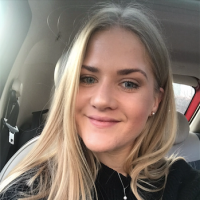
The Covid-19 pandemic has altered everyone’s lives significantly and students certainly weren’t exempt. We were unable to return to university and sit our examinations as normal and so many universities resorted to online exams.
In our current global situation, exams might not seem a priority. But, for students, exam stress combined with pandemic stress makes for a pretty hectic time. Here’s my experience with online exams and how they actually ended up alleviating my stress levels.

Discover the University of Liverpools' online postgraduate courses
What were my online exams?
I had three online exams in total. Two were essay-based, where the titles were released on a certain date and we were given two weeks to write the essays.
We were expected to reference as we would for an essay, just on a smaller scale. Our word counts were also reduced to 750 from the usual 2,000 because of the shortened time frame.
My third exam was a multiple-choice exam. I had 37 questions and 1.5 hours to complete them. All three of these exams were open book, but we were still expected to complete them alone, as in a normal exam.
How do you study for an online exam?
This was something I found quite difficult. I’m going to be sitting at home, surrounded by the entirety of my notes for the year. Do I revise or do I just scramble through my notes to find what I’m looking for when I need it? Luckily, I chose the former. It seemed a good idea to have my notes organised and summarised so that I could access them easily in the exam.
Although I didn’t revise as thoroughly as I would for a normal exam, I made sure to rewrite my notes for the semester, summarising as I went so that I could condense my notes. I then put all my notes on to a Word document, and added a contents page at the top so that I could find what I was looking for easily.
The search bar tool came in handy too. It’s not easy to find a single case study among 100 pages of notes. So, I’d search for the word I needed, and found it quickly.
For me, the key was to be prepared. Make sure your notes are organised so that you can find what you need quickly in the exam. Don’t be fooled by the fact that it’s online, this does not change the fact that it is an exam.
Tips for studying online and at home for university students 5 revision techniques to help you ace exam season (plus 7 more unusual approaches) Video: Five essential studying tips for students How to stop procrastinating – from a procrastination psychologist
How did I take the exams?
Perhaps the strangest part of all was sitting down at my desk to take a university exam, in my pyjamas with a cup of tea. If you had asked me my perfect exam conditions (if those even exist), that is how I would have described them. I really benefited from the new circumstances and I was definitely less stressed. There was no big, hot exam hall, intimidating invigilators or hundreds of students alongside you.
When the essay exams were released, I sat at my computer for the next few hours and did the first exam. It seemed silly to use the entire two-week period when I could dedicate my full attention over a couple of days and get it done. Every so often, I’d go downstairs for a drink or a break, which for me was key.
Don’t expect yourself to do it all in a day, Rome wasn’t built in a day, right? I’ve never been so stress-free in an exam in my life. I can only hope that my exam quality benefited from this too.
In terms of anti-cheating measures, for my multiple-choice exam, they created a bank of questions, so each person had a different test with different questions. This was the only anti-cheating measure that I was aware of, but this might have been different across other exam formats or subjects. We were told that we were trusted not to cheat, but no distinct measures were put into place except for this.
Online exams or in-hall exams?
The online exam experience was beneficial for me. I found myself thinking less about having time to get everything down and remembering things, but instead enjoying studying. I felt I had time to read into topics and really study them, rather than memorising things for an exam.
I deem exams to be a major flaw in the education system as they are. I usually find myself cramming so much information in that I don’t learn anything.
My entire schooling, I’ve had to revise a heap of materials to regurgitate them in an exam. And for what benefit? Shouldn’t we be assessed on our ability to use and transform information rather than simply memorising it?
This has led me to praise the online examination system. It was less stressful, less complicated and assessed capabilities beyond memorisation. I wouldn’t go as far as to say that I enjoyed taking these exams, but they were about as good as an exam could get.
Online exams for essay subjects, I can say, work rather well. The scope for cheating is limited anyway, because who can copy an entire essay? There’s also that thing called plagiarism to worry about. Why do students need to sit in an exam hall, costing the university time, staff and money, when they could be sitting it in the comfort of their own homes?
I cannot comment on the effectiveness of online exams for other exam formats, such as maths, where cheating would perhaps be easier. Or for physics, where you are often expected to handwrite equations. However, for essay-based subjects, I fully support the online system for exams. I deem it to be effective, stress-reducing and technologically forward.
My advice for taking an online exam
Do not panic, but revise and organise.
Take time to prepare your notes in the best way for you. Don’t think you can get away with not revising, because you’ll probably just end up making things stressful for yourself during the exam, which no one needs. Find comfort in knowing that you have power over the exam, perhaps more so than you ever have. Stay in your pyjamas or dress up for the occasion. Have a cup of tea or hot water bottle by your side if you need it. Don’t feel like you need to copy the conditions of a normal exam to a tee. This is your exam, be as comfortable as possible so you can do your best.
Other people might try to cheat or work together, but the important thing is to focus on your own work and have trust in your revision. You can do an exam alone in a hall, so you can do it alone at home.
Read more: How to deal with exam stress
Discover the University of Liverpools' online postgraduate courses
Register free and enjoy extra benefits
Home / Essay Samples / Education / Homeschooling / My Online Class Experience
My Online Class Experience
- Category: Education
- Topic: Homeschooling
Pages: 1 (417 words)
- Downloads: -->
Advantages and Challenges of Online Learning
Insights and reflections.
--> ⚠️ Remember: This essay was written and uploaded by an--> click here.
Found a great essay sample but want a unique one?
are ready to help you with your essay
You won’t be charged yet!
Reading Essays
Homework Essays
Importance of Education Essays
Indian Education Essays
Critical Thinking Essays
Related Essays
We are glad that you like it, but you cannot copy from our website. Just insert your email and this sample will be sent to you.
By clicking “Send”, you agree to our Terms of service and Privacy statement . We will occasionally send you account related emails.
Your essay sample has been sent.
In fact, there is a way to get an original essay! Turn to our writers and order a plagiarism-free paper.
samplius.com uses cookies to offer you the best service possible.By continuing we’ll assume you board with our cookie policy .--> -->